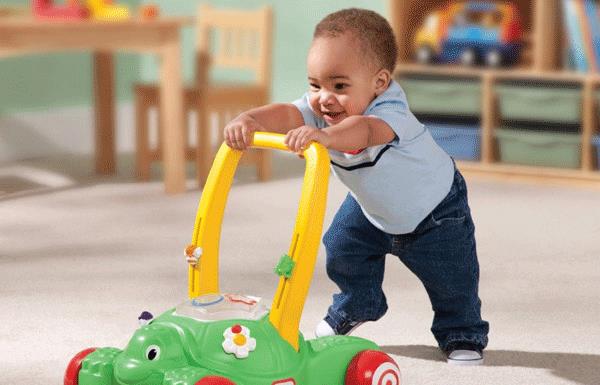The use of the walker for the reasons of the walker can adversely affect the development and put the baby at risk of deformity of the leg bone.
content
Should I buy a baby walker?
When is it best to let my baby use a toddler car?
One of the most common reasons for parents to let their children use a walker is because they think of the treadmill as a means of supporting their baby to walk faster. Some other parents compared two babies born at the same time, the other is a toddler and their baby is still crawling so impatiently and using a stroller for the baby to walk.
Baby walkers on the market are very diverse. The mother uses a rotating car, while the mother prioritizes the wooden walker with music to stimulate the baby to go early.

A walker is not the perfect choice for your baby's skeletal development
Not to mention relying on her grandparents' statements such as: "Three months of learning, seven months of crawling, nine months of treadmill" and seeing this as a milestone to compare and try to do everything as possible. baby walkers to keep up with these milestones. Actually all of these are not correct, parents should know that the stage of development of a baby will usually be:
Around 9 or 10 months, your baby will begin to walk and stand
About 12 months, we can walk
However, that is only a general number because each child has its own health and physical condition, so the time period mentioned above is not fixed due to the fact that some children can walk earlier. There are children who can walk more slowly, but usually in the period of 10-18 months they will learn to walk.
Should I buy a baby walker?
There are many types of walkers on the market such as wooden walkers, round carts with music, but it is best for parents to support their baby in the learning process so that they can stand on their feet without letting them depend. Get in the practice car.
If you let your baby use a walker, you can see that the baby moves quickly thanks to the trolley, but in fact the baby is moving, but the baby's legs, muscles and bones do not lift the weight of the body but rely entirely on the support frame. of the exercise vehicle, for a long time, the musculoskeletal system is not developed as strong as usual. In the process of raising children , mothers need to pay special attention to this issue.
At some point, when you let your child stand on his or her own feet without a exercise cart, do you think the skeletal system is strong enough and will the child get used to the weight of himself on his legs? little? So, is it really effective for your baby to use the exercise car with the expectation that he will walk faster? The answer is absolutely not.
Another factor is whether or not you use a walker or not, when the skeletal system and muscles complete the process of knowing how to crawl, crawl, crawl, stand ... naturally, when the time is right, the baby will practice walking and walking normally. Not even using a baby walker helps your baby to have stronger, stronger bones, muscles, ligaments.

Baby learns to walk super well thanks to the right mother! Children learn to walk quickly or well, depending on the guidance and guidance of parents. To support your baby in this very important period, you should avoid making the following common mistakes!
When is it best to let my baby use a toddler car?
That is when you see that your baby has started to stand firm, then you should encourage your baby to walk, let him move according to his or her ability and should not force him to walk early by a gym because when the baby's bones, muscles, ligaments are not Developed completely, reflexively, the baby will put his foot on the floor, his body will rely on the frame of the car to lift body weight and use his toes (not the foot) to push the car ...
It is these things that make the bones of the legs, muscles and feet incapable of bearing the body's force, affecting the development of bones, muscles, deforming the legs, the bow is very bad.
As we can see, the use of a baby walker is not recommended because it is completely not good for the baby's muscle and bone development and it also does not work as early as many parents. mistakenly, let us instead let the baby develop according to the right ability, when the baby is really ready to step steadily on his own feet.













